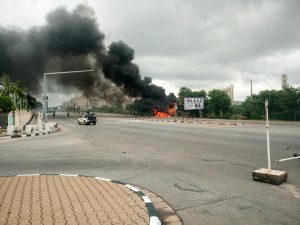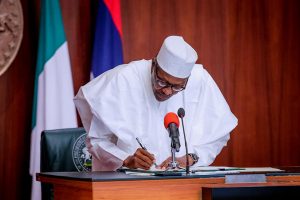Nigerians living in Abuja, the country’s capital city will be waking up today, Tuesday, July 23rd, 2019 unsure of what the security situation is as the crisis cracking capacity of the Buhari administration comes under another severe test. Yesterday was an all-day test of strength between cadres of the Islamic Movement of Nigeria, (IMN) otherwise known as Shi’ite in clashes that have left no less than a dozen dead, if claims of casualties on both sides are anything to go by. While the police authorities have confirmed the killing of a Deputy Commissioner of Police, the Shi’ite are saying they have lost eleven members. The death of a yet to be named female corper is not confirmed.

A rookie shot from yesterday
The Shi’ites have been operationalising a strategy of street action to push for the release of Ibrahim el-Zakzaky, their leader who has been in detention since December 2015 following a clash with troops. While officially, the strategy is to pile sufficient pressure on the government to release the cleric, the extent to which it exposes the vulnerability of the Nigerian state at a time of intense intra-elite rivalry under the Buhari regime makes it all the more frightening. In other words, nobody can predict dimensions that it can take. Unlike 1981 when the crushing of the Maitatsine revolt was an elite consensus, the power elite is highly fragmented in 2019. Although Shi’ite have a long history of dissention which makes some orthodox Muslims to deny them legitimacy in Islamic terms, a sustained confrontation with government can breakdown old barriers and open new ones in their favour in the current balance of local and external forces.
It is still difficult to predict which direction the Buhari regime will move in handling the Shi’ite issue. The government argues a national security ground for el-Zakzaky’s indefinite detention. Human rights campaigners offer a contrary argument by saying that national security could be as nebulous as any other thing. Nobody appears to know what sorts of information the government has about the cleric to warrant its disposition. There have been references to el-Zakzaky running a republic within the Republic and taking instructions from only a different Sovereign. Between the two broad arguments might lie the truth. Certainly, it is argued, there cannot be lack of a law under which el-Zakzay could have been tried since.

President Buhari, the suspected umpire
Meanwhile, the Shi’ites dimension of insecurity merely serves to shift attention from herdsmen violence which is an even greater source of friction and fear of even more generalized violence in the country. Widely interpreted as land grabbing campaign rather than innocent pastoralism, violence perpetrated by herdsmen has become an even greater threat to national cohesion than the decade Boko Haram insurgency. Although banditry is claiming more lives in Zamfara, Katsina and Sokoto states, intrusive herding is what is getting the country cagey and there is no consensus on how best to handle it. The government says the violence is that of politically manufactured herdsmen and that RUGA is a viable solution. But in the present configuration, RUGA has acquired a different meaning from whatever it meant previously.
Yet, the situation remains pregnant with all sorts of possibilities. Herding has become a problem across Nigeria in the context of modernization. Cattle herds compact the soil and render it out of use in affected communities. Cattles eat crops. Rape has been added in recent time, giving it the character of war since systematic rape is always interpreted as an instrument of war. Even under normal times, these are issues for win-win policy responses. Not only is the time abnormal in terms of perceptions and interpretations, it is also abnormal in sensitivity to control of land and water.
Why the state is unable to act as an umbrella and producer of fair deal for contending parties or conduct itself as to be seen to be doing so has been the puzzle. Instead of raising questions on the issue at a time more questions rather than answers are needed, the government is fond of coming up with answers, thereby providing the grounds for claims of presidential complicity in a hidden agenda.




























